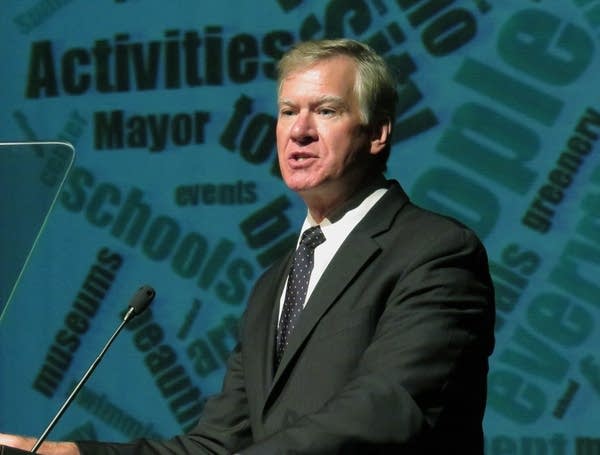Downtown St. Paul may say goodbye to free night street parking

The days of free on-street parking during the evening in downtown St. Paul appear to be numbered. Mayor Chris Coleman's 2016 budget released Tuesday includes a plan to enforce downtown meters until 10 p.m.
Officials say there's ample parking now downtown. They cite a study conducted last year that found at least 7,500 spaces available at any given time, even during peak demand at the height of the work day.
But that's not always apparent to people who visit the city.
"There's not a lot of convenient parking down here," said Joe Horan, who comes downtown several times a month. "There's certainly a lot of parking when you get a little closer to the river ... but convenient parking for, let's say you have a half hour meeting, 45 minutes, just to stop in, stop out — you might have to walk five, six blocks."
Create a More Connected Minnesota
MPR News is your trusted resource for the news you need. With your support, MPR News brings accessible, courageous journalism and authentic conversation to everyone - free of paywalls and barriers. Your gift makes a difference.
The problem, according to the study, is that because on-street parking has long been free in the evenings starting at 5 p.m., those spots fill up with long-term parkers, while many parking ramps sit mostly vacant. That's why Coleman said he wants to keep the meters running later.

"The goal will be to preserve on-street parking for shorter-term use by people who may be frequenting a small business, while encouraging longer-term parkers to move to ramps and lots," he said in his budget address.
Under the 2016 budget Coleman proposed, meter enforcement would be extended until 6 p.m. at the current rates, and rates would drop to $1 per hour until 10 p.m. Higher rates would apply on nights with big events at the Xcel Energy Center or CHS Field. Meters would remain free on Sundays.
The proposal also includes an upside for the city's budget. Coleman says the plan will bring in about $1.6 million in additional parking revenue.
"Doing so will allow us to share the cost of delivering city services with those who come into the city to work, shop or play," he said.
That's one reason the mayor was able to include a smaller-than-usual property tax increase in next year's budget. He proposes to raise the city's levy by just shy of 2 percent.
Council Member Dan Bostrom likes the sound of the extra money, but he's not sure whether to support the mayor's plan. Bostrom is worried charging more for parking could scare customers away from downtown businesses.
"You just don't want to take a chance on killing the golden goose, because there are a lot of options for people to go other places to spend their money where parking is free."
The St. Paul Area Chamber of Commerce supports the mayor's parking plan. Chamber President Matt Kramer says St. Paul should have made the change a long time ago.
"It comes across as horribly dramatic, and the only reason it is horribly dramatic is because St. Paul is mired in about 1972 when it comes to parking meters," he said.
That's overstating it a little.
The city has already upgraded many of its meters to modern digital models that accept credit cards. Part of the parking plan would get rid of the remaining coin-operated meters. Metered parking may be expanding to new parts of the city as well.
Coleman's budget also calls for experimenting with adding them to some smaller commercial districts. The city hasn't determined which ones yet.
To help people like Joe Horan find one of those 7,500 available spaces downtown, Coleman also wants to improve signs directing drivers to city-owned parking ramps.